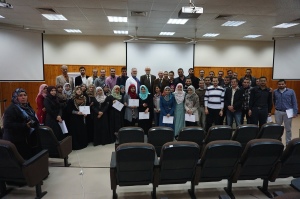Improvisational ACLS teaching in Gaza, by Dr. Bill Dienst
Gaza has plenty of physicians and nurses. It has its own medical and nursing schools. But what is limiting for Gaza’s health care professionals is post-graduate and continuing medical education.
Due to the siege and closure as a direct result of the Israeli occupation, Gaza is cut off from the outside world; it is very difficult for Gaza’s health professionals to travel outside of Gaza for medical specialty training, or for continuing medical education. It is also difficult for outside educators to travel into Gaza. These interactions inside and outside the strip do occur, but the logistics are very complicated given that Israel controls who may travel and who may not in and out of the Strip.
ACLS is a course developed by the American Heart Association, which teaches current evidence-based clinical practice for evaluating and treating cardiopulmonary arrest as well as pre-arrest conditions. It is designed to maximize the possibility for survival of patients who suffer from these conditions.
In its full form, ACLS is a 15-hour course offered over 2 days. Students are provided with a student manual a month before the course, and it is expected that they thoroughly study the manual before the course begins. In order to be certified by the American Heart Association, students must complete the entire course, demonstrate competency in managing cardiac arrest, and pass a written exam.
Since April 2013, Dr. Bob Haynes and I have brought elements of ACLS to Gaza. It has been an evolving enterprise that necessitates creative improvisation:
1) First, planning a course requires getting into Gaza. This requires approval of our admission by Israeli authorities. Though we have typically applied for travel to Gaza through our delegation months in advance, we often have not been granted approval to enter Gaza until weeks prior to our scheduled arrival.
2) Next, we coordinate with our contacts in Gaza. When, where and for how long will each course occur? This also includes the question of how many different venues we will be able to offer courses in during the week that we are here. We typically do not know this information until after our arrival, nor do we know how many students we will have until we arrive at the venue to teach the course. We have had classes as small as 15 students, and also huge classes in a large auditorium with over a hundred students. These medical and nursing students have varying levels of expertise.
3) Because of these factors, it has been so far impossible to provide student manuals to our students a month in advance.
4) The amount of time allotted for each class has varied from 3 hours to about 10 hours.
5) There are language and cultural logistical hurdles to negotiate. We do not speak Arabic, but fortunately most of our students understand English. In past venues, we have taught in English with the assistance of English-Arabic interpreters.
6) We figure in coffee breaks, meal breaks, and breaks for prayer. These necessities and their timing are often not clear before we start the course.
7) The quality of Audio Visual Aids, IT systems, teaching mannequins, ventilatory equipment and defibrillators varies at each venue.
Our teaching experience has been rewarding. Doctors and nurses in Gaza have appreciated our classes. We can see it in their eyes and feel it by the endless gestures of gratitude and hospitality that they extend to us. Although it is only a small gesture, we are also showing that there are those of us in the outside world that deeply care about Gaza and its people at a time when folks from here often feel that the world has abandoned them.
RSS feed for comments on this post. TrackBack URI
